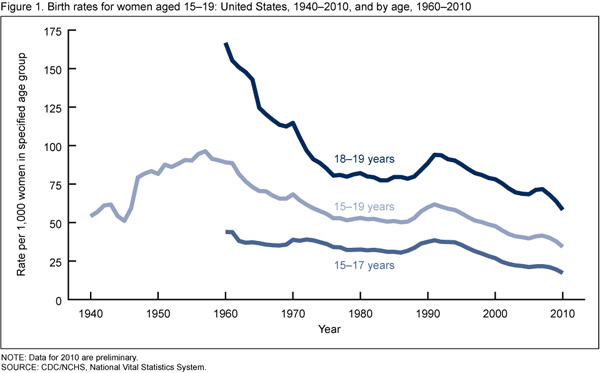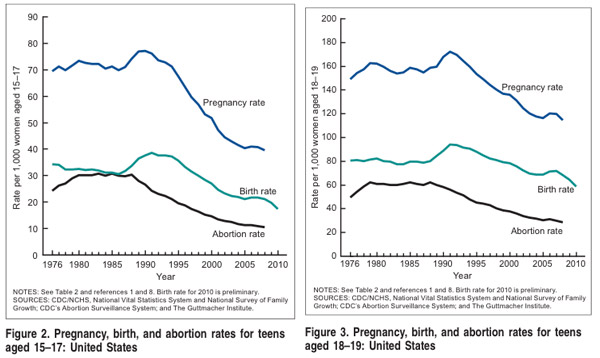
When someone points out a societal trend and asks "theories?" I can't help myself. (It's what I imagine taking meth is like.) Via Eric Zorn:

The massive decline among 18 and 19 year olds beginning in 1960 is a gimmie—that's when the pill was approved. During the 1970s there was controversy over its side effects, leading to a decline in use of the pill, so that might explain the leveling off.
The rise and continued decline around 1990 is more difficult. Could abortion have something to do with it? Teen abortion rates peaked in the late 1980s (PDF), then immediately started declining, in advance of the jump in teen pregnancy rates; they've both been declining ever since. It's correlation, not causation, but the timing is interesting.

The Guttmacher Institute looked into the birth rate decline afterwards, and found that one quarter of the drop was due to abstinence, and three quarters was due to lower pregnancy rates among sexually active teens. There's at least some social-scientific (PDF), historical, and anecdotal evidence that anti-abortion sentiment increased during the 1980s, particularly up until the end of that decade.
One reason for the decline in pregnancy rates in the 1990s seems pretty strong: the 1990s saw an increase in the kinds of birth control available and their efficacy, in the sense of users' ability to use them correctly. It reminds me of a passage from Steve Bogira's 1988 piece for the Chicago Reader, "A Fire in the Family":
But why did they themselves get pregnant in their early teens? That question elicits mainly shrugs. "I wasn't tryin' to get pregnant, just happened," Lavette says. "I was just doin' somethin' I had no business to," Dovie says. Their first pregnancies resulted from ignorance about birth control, they say, later pregnancies from failed attempts to use contraceptives. (Denise, Dovie, and Lavette got headaches and nausea from birth control pills, and so mostly used less reliable contraceptives. Laverne, too, used to say the pill made her sick, but Glo didn't buy that; Laverne just didn't like taking pills, Glo says. "I used to say to Laverne 'You take your pill?' 'Yeah, I took my pill.' When she go to school, I go and check behind–she don't be takin' nothin'. Sometimes she'd hold it on her tongue, wait 'til she go outside, and spit it out.")
You can't spit out an implant or an injection, and they don't have to be used on such a strict, frequent schedule. And while use of the pill declined among teens, use of more effective—in a usability sense, as opposed to a biological one—means of birth control increased:
Changing patterns of contraceptive use may also have contributed to lower pregnancy rates. While oral contraceptive use has declined substantially among teens, long-lasting hormonal methods have become popular among high-risk adolescents, many of whom appear to have switched from the pill. For example, among black teens who used a contraceptive method, 24% reported using injectables or implants in 1995; only 32% used the pill, compared with 75% in 1988. "The pill is not an easy method for all people to use," notes AGI's Stanley Henshaw. "You wouldn't think we would be gaining much for pill users to switch to Norplant or Depo Provera, but in fact with [high-risk teens] you do gain a lot."
Depro-Provera was approved by the FDA in 1992. Norplant was approved in 1990. Emergency contraception comes to mind, coming around the same time, but access to EC was slow to develop. Among the evidence, the rise in different birth control options seems the most compelling; not as much EC, which gets all the attention, or the pill, which is still synonymous with birth control, but injections and implants, a much quieter revolution that seems to have had some effect in declining birth and abortion rates among teens.
Update: I also can't help but think the AIDS crisis had some effect, particularly as a child of the 1980s. Magic Johnson announced he had HIV in 1991. Tim Richmond died of AIDS in 1991; you might not have heard of Richmond, but in the South (Richmond was a NASCAR driver) it was almost on the level of Johnson's news. Those of us who came into our teens in the early-mid 1990s had grown up immersed in a climate of profound, life-or-death fear about unprotected sex.
Photograph: M.Markus (CC by 2.0)


